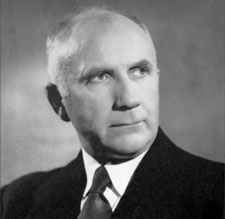May 28, 2015
Dr. John W. Scott, former Dean (1948-59), Faculty of Medicine, University of Alberta (U of A), strongly believed “research should not be looked upon as a luxury but as a very necessary part of the activities of a medical school. It stimulates the minds of those who do it and makes them more dynamic and critical teachers.” Dr. Scott was associated with the U of A and faculty from 1914-1969. He was a member of the academic staff for 36 years, and served under the first six university presidents.
Dr. Scott’s predecessor as the Director of Medicine, Dr. Edgerton Pope, described Dr. Scott as strong, steadfast, and a general internist of rare quality. His partner Dr. Frank Elliott described him as a calm, kind gentleman who never got tired and could remember every prescription he wrote.
Research should not be looked upon as a luxury but as a very necessary part of the activities of a medical school. It stimulates the minds of those who do it and makes them more dynamic and critical teachers.
Early days in medicine and academia
Dr. Scott began his medical career in September 1915, as a member of the third class of premedical students at the U of A. Although Dr. Scott’s medical studies were interrupted by his WWI service (1918/19), he returned to Canada and graduated from McGill in 1921.
While attending a conference on the new drug insulin (1923), Dr. Scott impressed the presenter, Prof. J.B. Collip who then asked him to join the U of A Faculty of Medicine. Two years later Dr Scott attended the “thrilling” convocation of the first eleven MDs that graduated from the U of A, including Dr. Leone McGregor, the first female graduate from the U of A Faculty of Medicine.
His one publication with Prof. Collip was on “The effect of parathyroid hormone in normal animals”. In 1928, Dr. Scott succeeded Dr. Colllip as the head of Biochemistry, before he left to study internal medicine in Britain. He returned to the faculty with a Canadian fellowship and special training in GI and endocrine diseases in 1932.
Dr. Scott invited Dr. Collip back to U of A in 1956 to unveil a plaque commemorating Copp's discovery of parathyroid hormone in 1925.
Medical education
Dr. Scott loved presenting actual patients to his undergraduate classes. One was a class member’s future wife, who had just developed diabetes. Another was Charles Allard who suffered a spontaneous pneumothorax while cross-country skiing on the North Saskatchewan River.
During WWII Dr. Scott taught an onerous 20 hours a week, as the faculty compressed each academic year into 6 months. The faculty managed to graduate two extra classes by 1945.
After the war, Dr. Scott was a member of the 1946 Nucleus Committee that initiated and oversaw the first residency training programs. 70% of the postgraduate trained physicians returned to Alberta and 50% joined the faculty.
After becoming the Dean of Medicine (1948-1959), Scott immediately began looking for his successor and secured the return of Dr. D.R. Wilson. Scott continued as the Professor and Head of Medicine until 1954, when he relinquished the position to Dr. Wilson.
Under his deanship the U of A received three Markle scholarships for Drs. D.R. Wilson, R. Fraser and L. McLeod to start programs in endocrinology, cardiology and nephrology.
Honored by his Alma Mater
The class of 1961 suggested the hospital library be named after Dr. Scott. The name continued when the medical library was moved to the Walter C. Mackenzie Health Sciences Center in 1984. The inscription at the entranceway reads “He was to all of us like Luke the beloved physician.”
Today, the U of A’s Scott Honor Award recognizes the graduate who is “expected to achieve a distinguished position in scholarship, leadership and achievement.”
An illustrious career
Dr. Scott was President of ACMC (1955-57), the Royal College (1957-60), and received an Honorary LLD from U of A (1970). He had the pleasure of conferring an MD on his son Foster (1951) along with a FRCPC (1961), as well as an MD on his daughter Moira (1957)
As the honorary president of the class of 1950, Dr. Scott could, remarkably, still remember everyone’s name and their academic shortcomings 20 years later.
Dr. Scott retired from the faculty on his 75th birthday (1969) but continued to practice until 1979 (age 85).
